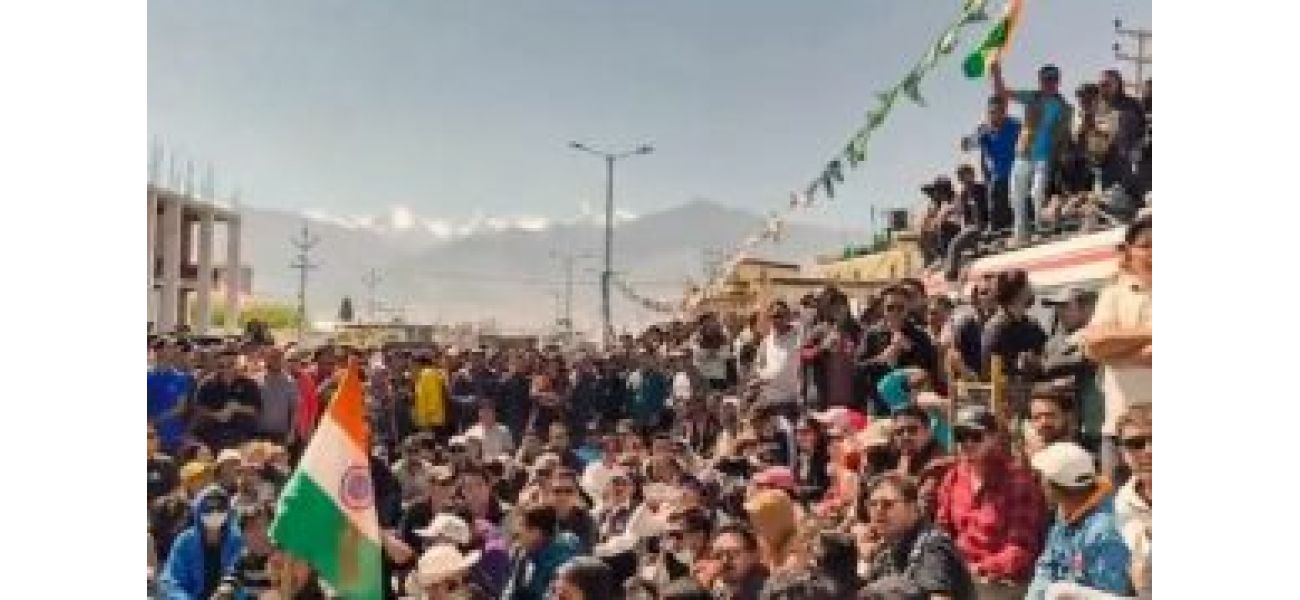The people of Ladakh are upset or furious.
Ladakh, an Indian region bordered by China and Pakistan, is strategically important but its political future is uncertain despite being separated from Jammu and Kashmir in 2019.
September 29th 2025.

Located between China and Pakistan, Ladakh is a region of great strategic importance to India. However, despite its separation from Jammu & Kashmir in 2019, its political future remains uncertain even after five years. The initial excitement of its residents for better governance and representation has now turned into disappointment for many. This frustration was evident when protests erupted in Leh on 24 September, where demonstrators were demanding statehood and constitutional safeguards. The situation turned violent after two hunger strikers were hospitalized, leading to clashes with the police and the burning of the ruling BJP's local office. Tragically, four protesters lost their lives and many were injured in the chaos.
The government views these protests as untimely and disruptive, accusing local leaders of acting in bad faith. They even suggest that foreign influence may be behind the unrest, pointing to the arrest of climate activist Sonam Wangchuk, who was on a hunger strike. Despite being a highly respected figure in the region, Wangchuk was arrested under the National Security Act and transferred to a prison in Rajasthan. The police are also investigating his alleged links with Pakistan. However, the protest leaders deny these allegations, stating that the violence was instigated by fringe elements and not the organized movement. While this possibility cannot be completely ruled out, it is also important to consider other factors at play.
When the government revoked Article 370 and made Ladakh a Union Territory, the decision was initially met with jubilation in Leh. The Buddhist-majority district had long been demanding separation from Jammu & Kashmir, where state politics was dominated by leaders from the Valley and Jammu. The creation of a UT was seen as a long-awaited recognition of their distinct identity. However, this enthusiasm quickly faded when Ladakhis realized that unlike the new UT of Jammu & Kashmir, their UT would have no legislature. They lost their four MLAs in the erstwhile J&K Assembly and were left entirely in the hands of bureaucrats appointed by New Delhi. For many, this was worse than the previous governance structure.
This disappointment has been compounded by concerns over land rights, job opportunities, and the preservation of Ladakh's unique demographics, environment, and culture. The changes in domicile rules in Jammu & Kashmir have heightened fears that similar policies could lead to a demographic shift in Ladakh. As a result, local voices have united in demanding stronger constitutional safeguards. Calls for full statehood, protections under the Sixth Schedule of the Constitution, and guarantees for jobs and political representation have grown louder.
These demands are not coming from a few isolated individuals, but rather from the Leh Apex Body and the Kargil Democratic Alliance, which represent a wide range of political and social groups. They have repeatedly urged the government to take concrete steps to safeguard Ladakh's tribal communities, environment, and cultural heritage. However, despite several rounds of dialogue, New Delhi has yet to make any significant decisions. A meeting was scheduled for 6 October, but youth groups insisted on advancing the timeline and achieving tangible outcomes through discussions.
The mistrust between New Delhi and Ladakh has now widened, and this calls for a careful and measured dialogue rather than confrontation. Ladakh is not just a borderland; it is a critical frontier whose people have always seen themselves as proud Indians. For decades, Ladakhis have been defending India's borders and serving as the first line of defense against incursions from China and Pakistan. Labeling dissenting Ladakhis as "anti-national," as this government has done with other dissenters, only deepens the feeling of alienation.
It is crucial to assure the people of Ladakh that their democratic aspirations and cultural identity can be protected without compromising national security. The calls for statehood and Sixth Schedule protections are not unusual, as they come within the framework of the Constitution. What makes Ladakh unique is that these demands unite both Buddhists and Muslims, showing a rare cross-community consensus in a region often portrayed as divided. This unanimity should compel the government to genuinely listen to the demands of Ladakhis.
For New Delhi, the unrest in Ladakh is a significant challenge, especially in light of its mishandling of the crisis in Manipur, which continues to be a burning issue even after two and a half years since ethnic violence broke out in the state. Such unrest in strategically vital regions within the country's borders only adds to the problems created by the government's misguided foreign policy.
The government views these protests as untimely and disruptive, accusing local leaders of acting in bad faith. They even suggest that foreign influence may be behind the unrest, pointing to the arrest of climate activist Sonam Wangchuk, who was on a hunger strike. Despite being a highly respected figure in the region, Wangchuk was arrested under the National Security Act and transferred to a prison in Rajasthan. The police are also investigating his alleged links with Pakistan. However, the protest leaders deny these allegations, stating that the violence was instigated by fringe elements and not the organized movement. While this possibility cannot be completely ruled out, it is also important to consider other factors at play.
When the government revoked Article 370 and made Ladakh a Union Territory, the decision was initially met with jubilation in Leh. The Buddhist-majority district had long been demanding separation from Jammu & Kashmir, where state politics was dominated by leaders from the Valley and Jammu. The creation of a UT was seen as a long-awaited recognition of their distinct identity. However, this enthusiasm quickly faded when Ladakhis realized that unlike the new UT of Jammu & Kashmir, their UT would have no legislature. They lost their four MLAs in the erstwhile J&K Assembly and were left entirely in the hands of bureaucrats appointed by New Delhi. For many, this was worse than the previous governance structure.
This disappointment has been compounded by concerns over land rights, job opportunities, and the preservation of Ladakh's unique demographics, environment, and culture. The changes in domicile rules in Jammu & Kashmir have heightened fears that similar policies could lead to a demographic shift in Ladakh. As a result, local voices have united in demanding stronger constitutional safeguards. Calls for full statehood, protections under the Sixth Schedule of the Constitution, and guarantees for jobs and political representation have grown louder.
These demands are not coming from a few isolated individuals, but rather from the Leh Apex Body and the Kargil Democratic Alliance, which represent a wide range of political and social groups. They have repeatedly urged the government to take concrete steps to safeguard Ladakh's tribal communities, environment, and cultural heritage. However, despite several rounds of dialogue, New Delhi has yet to make any significant decisions. A meeting was scheduled for 6 October, but youth groups insisted on advancing the timeline and achieving tangible outcomes through discussions.
The mistrust between New Delhi and Ladakh has now widened, and this calls for a careful and measured dialogue rather than confrontation. Ladakh is not just a borderland; it is a critical frontier whose people have always seen themselves as proud Indians. For decades, Ladakhis have been defending India's borders and serving as the first line of defense against incursions from China and Pakistan. Labeling dissenting Ladakhis as "anti-national," as this government has done with other dissenters, only deepens the feeling of alienation.
It is crucial to assure the people of Ladakh that their democratic aspirations and cultural identity can be protected without compromising national security. The calls for statehood and Sixth Schedule protections are not unusual, as they come within the framework of the Constitution. What makes Ladakh unique is that these demands unite both Buddhists and Muslims, showing a rare cross-community consensus in a region often portrayed as divided. This unanimity should compel the government to genuinely listen to the demands of Ladakhis.
For New Delhi, the unrest in Ladakh is a significant challenge, especially in light of its mishandling of the crisis in Manipur, which continues to be a burning issue even after two and a half years since ethnic violence broke out in the state. Such unrest in strategically vital regions within the country's borders only adds to the problems created by the government's misguided foreign policy.
[This article has been trending online recently and has been generated with AI. Your feed is customized.]
[Generative AI is experimental.]
0
0
Submit Comment





